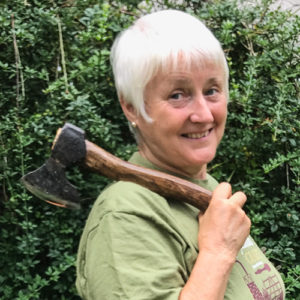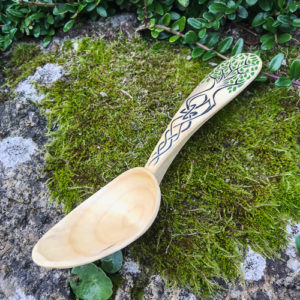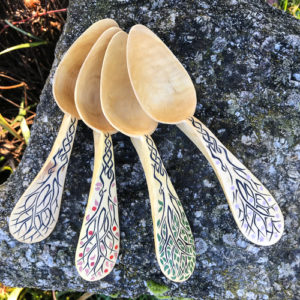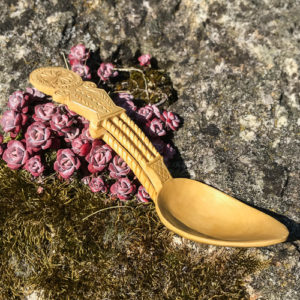
Carve a simple and elegant one-piece breton-style spoon!
Go into the woods and fell a tree, split it, rough it out using an axe and drawknife, then carve the spoon using straight and curved knives. On the final day you will be able to decorate your spoon using the traditional techniques of chip carving and colored wax inlay.
Throughout the workshop, Jane will help you refine your axe and knife techniques and learn safe, efficient methods of work including a range of knife grips. More experienced carvers will be encouraged to explore decorated and pierced styles of one piece spoons that were made around southern Brittany in the 1800s.

If you have them, please bring a pencil, ruler, axe, straight knives, curved spoon knives, small saws with you. Don’t worry if you don’t have these as we can provide them.
Amazingly delicious lunches will be provided by Seth Elliott. Class size is limited to 6 students.
A $150 deposit is required to register. If written cancellation is received up to two months before the class start date, a 50% refund will be provided. Within two months no refund is offered.
BRETON-STYLE SPOON CLASS, July 22nd to 24th, 2019 – $650
If the class you want is full, don’t despair! Cancellations might happen, so email me to be added to the waitlist.


Jane Mickelborough’s Bio
I have carved all my life, but I only started carving wooden spoons from green wood about eight years ago.
I have taught regularly at Spoonfest in the UK, at Täljfest in Sweden and in 2017 I was honored to be awarded a Sundquist-Coperthwaite Slojd Fellowship. This enabled me to travel last year to both Greenwood Fest and the Spoon Gathering in Milan.
As well as teaching a monthly spoonclub at home, my husband Peter and I organize an annual green wood working festival where I live, in Brittany, NW France. (www.fineslames-petitescuilleres.com)
Although I do different types of green wood-working, I am fascinated by wooden spoons – what appear to be simple, everyday objects are, in fact, very subtle three-dimensional shapes. The variability of the wood itself means that making a beautiful, functional wooden spoon is a real challenge that is never the same twice.
I am particularly interested in the traditional spoons that used to be made in Brittany. These intricately decorated spoons, which were highly decorated and often made to fold, were used at weddings and festivals, where it was usual to bring your own spoon and knife. My blog posts give some more information about these old spoons: https://janeswoodenspoons.blogspot.fr
Visit Jane Mickelborough’s website and Instagram.
